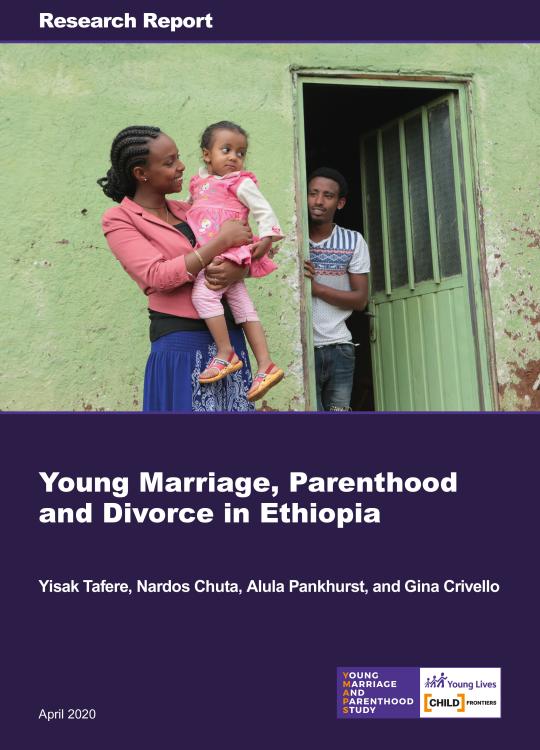
Breadcrumb
Young Marriage Parenthood and Divorce in Ethiopia
New research sheds light on what life is like for Ethiopians who married, cohabited and became parents as adolescents, and identifies a raft of support measures.
Young Ethiopians have a greater say over marriage decisions than their parents, yet pressure from poverty and social expectations continue to drive important life decisions. Youth relationships remain governed by entrenched gender norms which constrain young women's agency and limit the life choices of both women and men.
Ethiopia has made significant efforts to reduce child marriage by tackling the causes of child marriage. Despite this, the country has amongst the highest rates of child marriage in East Africa. At the same time, little is know about the daily lives of millions of adolescents who are married, co-habiting and parents or what support they need to fulfil their aspirations in life.
A new research report, 'Young Marriage, Parenthood and Divorce in Ethiopia', published today as part of Young Lives and Child Frontiers Young Marriage and Parenthood Study (YMAPS), reveals what life is like for Ethiopians who married, cohabited, were parents or divorced as adolescents, and identifies a raft of support measures to help them and their families.
The findings are set within the wider context of the Young Lives study of 3,000 young people over the past 20 years, which found that more than 1 in 3 women in the Ethiopian sample are married by the age of 22 and 1 in 10 have given birth by before they are 18.
YMAPs’ researchers interviewed 83 young Ethiopians and held 15 focus group discussions in three Young Lives’ study locations, two rural and one urban; in Addis Ababa, Oromia, and Tigray. They discovered that while young people often talk about having a greater say in who they marry or live with, the majority had not planned or wanted to marry or become parents as adolescents.
Yisak Tafare, one of the report authors, says: ‘More adolescents are choosing to marry or live together, but many young people told us that they regret their decisions over time often because they were not able to continue with their education and realise too late they had not been ready to face the challenges of married life. We found this to be especially true when they felt pressured to marry – by their parents, by social expectations, or because of an unplanned pregnancy.’
Key findings
With changes brought about by education and urbanisation, adolescents and young people have a greater say compared to their parents in decisions about who, how and when they marry regardless of parental consent. Cohabitation is more common in urban areas, often because of unintended pregnancy, or the desire to maintain a sexual relationship while temporarily bypassing the costs of formal marriage. Increased agency often comes at a cost, as young peoples' unions become fragile if they lack formality or family backing. Elders continue to negotiate marriages and customary payments in rural areas despite greater opportunities for youth to select their partners, Young people still value the social status associated with being married and becoming parents. But in some communities, rising costs of marriage payments prevent young people pursuing formal marriage, pushing them into socially and materially precarious partnerships and potential indebtedness. Unintended pregnancies are hard to avoid as unmarried adolescent girls and young women cannot easily access contraception. Early pregnancies are a common source of regret for both young women and young men because they are pushed into early marriage and limit thier future life choices.
The young people interviewed told researchers that marriage, motherhood and fatherhood are vital sources of joy, pleasure and happiness, but their new roles and living arrangements are difficult to manage.
Many young couples felt they had been socially, psychologically and materially unprepared for the significant responsibilities and challenges of married life. Within marriage, domestic work falls largely to young wives and husbands tend to take all major decisions. Young woman's agency, even over fertility, is often constrained by patriarchal values. Girls' and young women's subordinate status makes them vulnerable to violence within their intimate relationships. Young people’s relationships are fragile in the face of limited social and material resources and lack of preparation. The main reasons for separation and divorce are: early age at marriage; the husband or partner’s inability to finance the household; spousal conflict; suspected affairs; and husbands’ drinking and spending habits. Single women, whether unmarried, separated or divorced, face particular vulnerabilities, social stigma and challenges in accessing mother and child services and support with childcare.
The authors promote a series of multi-sectoral and coordinatedapproaches to ensure the well-being of young men and women as they form couples, establishhouseholds and bring up children. These include
Tailoring services and programmes to ensure adolescents who are married or parents are provided with opportunities, safety nets and training, notably in financial literacy. Using conventional and social media to counter the stigma towards young women who are in relationships but have not married, or who are divorced. Promoting greater decision-making by adolescent girls over fertility through school clubs and programmes to reach out- of-school adolescents, using conventional and social media and role models. Encouraging financial support from parents can help newlywed or cohabiting couples to establish themselves, aided by opportunities for work and affordable housing support for male and female youth. Promoting awareness of women’s rights and the prevention of gender-based violence through schools, youth groups and media in order to counter the dominant role of patriarchal gender norms and unequal power relations within marriages Improving young peoples’ access to contraception and advocating for safe abortion, notably by enhancing the role of school clubs and health extension services. Policies and social norms promoting a fairer division of household labour and childcare responsibilities between women and men, and more equal decision-making over property and family planning.
Nardos Chuta, one of the report’s authors, says: ‘Policies and programmes must pay more attention to the views and needs of the millions of young people, particularly young women, who have experienced marriage, cohabitation, separation or divorce. We hope that this report will contribute to a greater understanding of what it means to be married early, so that they can receive the support they need, so that young women in particular have more choice in their lives, and the UN Sustainable Development Goal target on child marriage can be met'

